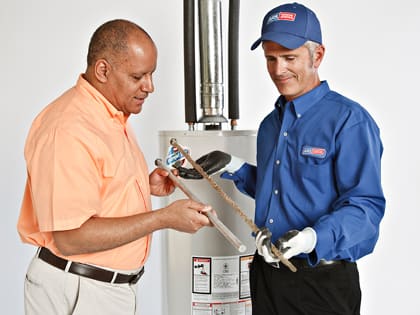Signs You Can Benefit from New Water Heater Installation
 Hot water is a home necessity for bathing and washing. If your water heater is starting to fail, the best solution is to replace it with a newer, more efficient model for greater home comfort and energy savings. There are several signals your aging water heater may send when it’s time for new water heater installation. Contacting your plumber as soon as you experience a problem with your hot water is the best way to determine whether water heater repair or replacement is the solution to your needs.
Hot water is a home necessity for bathing and washing. If your water heater is starting to fail, the best solution is to replace it with a newer, more efficient model for greater home comfort and energy savings. There are several signals your aging water heater may send when it’s time for new water heater installation. Contacting your plumber as soon as you experience a problem with your hot water is the best way to determine whether water heater repair or replacement is the solution to your needs.
Your Water Heater Is Old
The average gas-powered water heater is expected to last approximately ten years, while electric water heaters tend to last for an average of 15 years. If your water heater is approaching this age range, it may not be working as efficiently as it once did. This can result in higher bills and less comfortable showers. Talk to a plumber about your aging water heater to see if it can be repaired or should be replaced.
If your water heater has reached the end of its expected lifetime, it may be time to consider the benefits of new water heater installation. With good care and maintenance, many water heaters can last well past their expected lifetimes. However, the older your water heater becomes, the less efficient it will be compared to the newest models, simply because of advancements in technology, design, and production standards since you bought your current appliance. Especially if you are concerned about the cost of hot water or the performance of your system, new tankless water heater replacement is a wise investment in your comfort and your home’s energy efficiency.
Your Hot Water Is Rusty
Rust is another common sign of water heater troubles. As your storage tank water heater ages, mineral deposits build up inside the tank. While regular flushing can remove most mineral buildup, the longer your water heater remains in service, the more buildup it will experience. If your hot water comes from the tap with visible dirt or rust, or if your hot water has an unpleasant, metallic taste, it is likely that your water heater’s storage tank is deteriorating.
When you see rust around your water heater tank or actually going through the water in your faucet, it is definitely time to contact a plumber. This can be a sign that water is creeping into places it shouldn't be, namely inside your water heater. Rust can also eventually lead to corrosion and failure of the tank. Your plumber might find that the rust problem is coming from the pipes or the water heater tank itself. Your plumber may be able to improve the quality of your hot water by flushing the tank and replacing its sacrificial anode rod, but these measures are often temporary and may not be effective if your water heater has significant mineral deposits.
Your Water Heater Is Loud, Leaking, or Not Working
Loud: Water heaters typically produce little noise when they’re working properly. Thus, loud noises such as rumbling or clanking indicate a problem inside the appliance. These noises are most frequently due to failing burners or mineral buildup inside the tank, which can lead to a drop in water heating efficiency and corrosion that causes leaks in the tank. If your water heater is making noticeably loud noises, it’s a sign that it is nearing the end of its lifetime and you should consider your new water heater options before your current appliance fails.
Leaking: While your water heater is responsible for providing hot water for your home, it can be a bad sign if you find water around this fixture. A leak or crack in your water heater tank can cause water to pool up near its base. Call a plumber to see if repair is possible. Your plumber might be able to repair the leaks, but if not, you might need a new unit.
Not working: If your water heater isn’t working properly, you might be stuck with cold water when you’re getting ready in the morning. If adjusting the thermostat doesn’t solve the problem, then there could be a problem with the heating element. Sometimes, the heating element can be reignited, but if it repeatedly goes out or cannot be re-lit, your water heater should be inspected by a professional.
Now the only question is if it's better to repair your hot water heater, or replace it. You can read more about repairing vs. replacing your hot water heater on our blog. Would you like to learn more about how our experienced plumbers can make water heater repair or installation, an easy and stress-free experience? Call ARS/Rescue Rooter and explore our full range of home plumbing services and solutions, including drain cleaning, leak repair, and emergency plumbing service.


